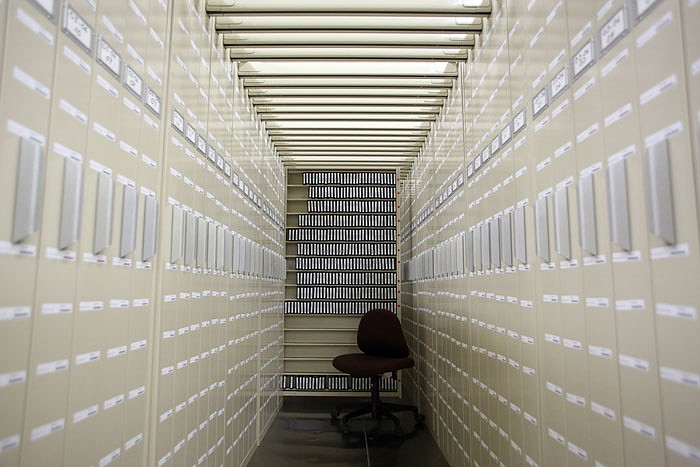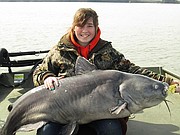Who owned the earliest recorded properties in Cole County? And who bought those parcels from them later?
The fragile, bound deed books inside the Cole County Recorder of Deeds office in the county annex building hold the answers.
Genealogists, historians and title company representatives occasionally would look in these earliest volumes, called "A through Z" in the recorder's office.
Inside, the handscript held personal stories well beyond the exact legal descriptions of today's records, said Recorder Ralph Bray.
A partnership with the Secretary of State's office will not only preserve the nearly 200-year-old pages but will make the county's earliest deed records easier to access for the general public.
Cole County's A-through-Z records, so named for the 999-page, alphabetically stored books, begin with March 1821 and end with May 1870.
The state archive wanted to add the county's records to its collection, which is stored on microfilm in a temperature-controlled vault to last 500 years, said State Archivist John Dougan.
"The Secretary of State's office had an interest in collecting that old information, and they had the tools and resources to do it," Bray said. "It also was an incentive for our office to get digital and microfilm as a result. It sounded like a deal we couldn't pass up."
The county recorder and the state archive share the charge to hold public information.
"We all take our responsibility very serious; we're charged with keeping these documents," Bray said. "It's important to back up, to safeguard the information and keep it for future use."
Technology is allowing them to make it more easily accessible as well.
Cole County's 26 volumes are being digitized at the state archive, a few at a time.
For Chief Deputy Recorder Judy Ridgeway, seeing the empty slots in the county vault for the few that are on loan is a bit disconcerting, she said.
At first, "we asked a lot of questions and had many conversations," Bray said. "We came to the recognition they have as much respect for these documents and information as we do."
Once in the care of the archive staff, Cole County's record books start in the lab, where each page is individually cleaned and repaired by Curator Diane McKinney. She also removed the binding and its glue, making it easier for flat scanning, particularly revealing names and information lost in the glued-together gutter.
Although not a historian, McKinney said she has enjoyed reading excerpts as she prepares the pages. She even came across the name of an ancestor who was justice of the peace.
"This is nice; it tells who was in Jefferson City and the smaller towns," McKinney said. "Working on this is fun."
With the pages prepared, Cindy Warden, a tech II, sets the book one page at a time on a state-of-the-art planetary scanner to be scanned into digital files. Although the machine is slow, it accommodates the large, thick books holding the county's land history. The book cradle adjusts to level the book as needed, and a glass top flattens for the scanning eye to pass over cleanly.
The 8-year-old technology is one of the crucial pieces the state archives has used to improve its online collection of state historical documents.
Before that, there was no digital access to images on microfilm, still the industry standard for long-term storage.
"Digital is an excellent means for access," Dougan said. "The byproduct is better preservation."
The third step: the unbound book pages are returned to the county office along with a disk with all the digital files. The state archive keeps a copy of the records on microfilm, stored in the vault with about 70,000 other statewide county files, a total of about 80 terabytes of digital images, said John Korasick, director of local records.
"Science and technology have really aided in the mission to make records accessible," Dougan said.
The archive's local records program has been working with counties for about 25 years, sharing records management methods and preservation.
When Bray took office in 2015, he soon contacted the state archive, knowing it would be a good resource.
Next, the county office will use its preservation funds, from deed recording fees, to better preserve the nearly 26,000 pages of A-through-Z.
The recorder's office also plans to improve its hardware and software to better provide records online, Bray said. These oldest deeds will be the pilot project to create a means for more current deed records to be made public, he said.
"Our hope is more people will use these records and do research," Ridgeway said. "It's interesting, if you're into that kind of work."


